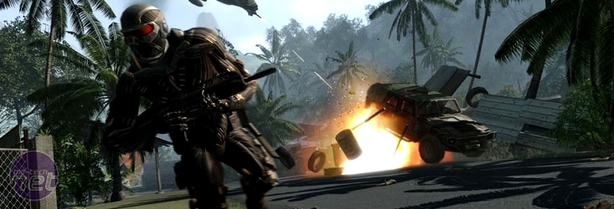The Good News
That’s the bad news, but fortunately that’s only one perspective on it all and any sensible person can plainly see that just because a number of the big corporations are delaying their PC titles and experimenting with RTS’ for consoles, doesn’t mean that the PC platform is crumbling.These worries about the death of PCs have been going round and round for a while after all – and we’re all still here with our GPUs, PSUs and all those other sexy l’il acronyms.
In fact that’s an important point; these arguments do keep coming around on a regular and predictable basis because of consoles. Every time the new console generation arrives people start migrating to the world of gamepads and RRODs and lamenting the death of keyboards and BSODs. Always though, it’s just a few years before they all come back again – just as soon as the consoles start to plateau graphically in the middle of their 5-10-year lifespan and developers finally catch up with the latest advances on the PC, which hasn’t had to sit still for all that time like the consoles have.
When that happens the consoles don’t start to ‘die out’ obviously because they, unlike PCs, are expected to have a limited shelf life and are able to live on longer through the platform devotees and those looking for a budget gaming option. The PC meanwhile gets a resurgence of interest as the hardcore console gamers, ever attracted to new marketing hype like moths to flames, come back to the PC. As usual there’s probably a note of cynical exaggeration in our view on this, but there’s a noticeable trend among gamers to help support the theory.
Several times during our prep for this article we found people comparing the fall of PC gaming to the way that adventure games ‘died out’ in the mid 90s, but it’s important to point out the flaw in that point of view because it hints at another major strength for the PC platform.
Oh, and adventure games didn’t really die out by the way – they just fell out of fashion and they too are now making a comeback. There’s a season for everything – except in Germany, where the PC and adventure game genre seem to have never fallen from grace, even by a little.
The main reason that the adventure game genre was seen to collapse out of the market was simply that, in the eyes of most people, there was only a single company in the genre; Lucasarts. Yes, Revolution Software, Sierra and a few dozen others were big players, but if you ask someone about adventure games then their mind always goes to Lucasarts first. Monkey Island, Day of the Tentacle – those are the landmarks of the genre, not Simon the Sorceror. There was one big player and, when it quietly decided to focus on Star Wars at the exclusion of all other projects, nobody else was really able to step into the power vacuum. The fate of the adventure game genre lay in one company’s hands and they elected to throw it away. Revolution Software valiantly tried to carry on with the Broken Sword franchise, but quickly broke it into something unrecognisable - a 3D sokoban clone, essentially.
PCs though aren’t in that situation because, unlike consoles, they aren’t closed platforms and their success is fragmented across a few hundred companies. There are too many people profiting and fighting for the PC platform for it to go quietly into that good night and, while that does bring a few problems of compatibility and support when so many companies are involved, it hasn’t killed PC gaming yet and it won’t do anytime soon.
Intel, AMD, Nvidia, ATI – on the hardware side there are just too many people making too much money from gamers to give up on PC gaming just yet and, just because the PC Gaming Alliance has proved mostly useless, that doesn’t mean that the group isn’t good for something. If nothing else it reflects how many companies are seriously invested in the PC platform.
It’s worth pointing out that this also possibly makes the PC the cheapest platform to develop for too. There are few licensing fees or dev-kits to take into account and there are plenty of companies who’ll be happy to help you out with the more costly parts of the business, like Nvidia does through the The Way It’s Meant To Be Played program. There’s no demands on features you have to include in your title either, unlike with the Xbox 360, where Microsoft insist that even games like Tales of Monkey Island have a leaderboard.

MSI MPG Velox 100R Chassis Review
October 14 2021 | 15:04












Want to comment? Please log in.